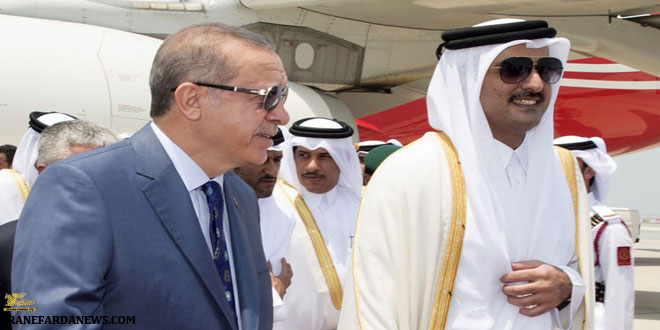
by:Mohamad Kawas
Turkish President Recep Tayyip Erdogan’s recent visits to Saudi Arabia, Kuwait and Qatar can only be understood as a required first step to defusing tensions with the Gulf countries that was created by his rash reactions to the Qatar crisis, reactions unworthy of a major power.
It is difficult to imagine that Erdogan was personally making the trip to the region to argue Qatar’s case or to get a better picture of the conflict with Doha. The details of the crisis with Qatar are public knowledge and Turkish Minister of Foreign Affairs Ahmet Davutoglu was directly briefed by Saudi officials.
Erdogan chose to start with Saudi Arabia, a key country in the boycott against Qatar, in the hope that his initiative would also be welcomed by Egypt and the United Arab Emirates, whose relations with Turkey are openly antagonistic.
It is obvious that Riyadh and Ankara have gone to great lengths to steer clear of open diplomatic incidents. What’s intriguing is that any potential Turkish military force sent to Qatar would be perceived by Saudi Arabia and the Gulf countries as a provocation. This would escalate and deepen the crisis with Qatar, giving it a military dimension that was absent from the demands of the boycotting countries.
From the start of the crisis, Ankara adopted two approaches in tandem. The first was to clearly and publicly support the Qatari camp politically, militarily and in the media. The second approach involved showing deference to the Saudi position and declaring Ankara’s reliance on the Saudi monarch’s ability to find the best way out of the crisis.
Saudi authorities have refrained from verbally attacking Ankara and have purposely minimised Turkey’s position on the crisis, treating it as secondary in comparison to the positions of the major powers and in light of their foreign ministers’ shuttle visits to the Gulf. Riyadh has kept some distance from the Turkish position, giving Ankara leeway to reconsider its bias in what Riyadh considers an internal Gulf affair.
Erdogan, whose tour of the Gulf was portrayed as a mediation mission, knows very well that Turkey has no credibility as a mediator given its blatant bias in favour of Qatar. His visit to the Gulf was undertaken with different objectives in mind: Mending Turkey’s relations with the Gulf countries in general and Saudi Arabia in particular.
Erdogan realised that Riyadh and its regional allies are an important regional pole with significant international ramifications and that it would be wise and beneficial for his country and his political regime to maintain good economic, political and geostrategic relations with the Gulf Cooperation Council countries.
Erdogan is also quite weary of Turkey’s shaky relations with Moscow, Washington and the European Union and fears that his country’s influence in Iraq and Syria will decline.
By contrast, Riyadh received Erdogan with a great deal of confidence. Within the context of the crisis with Qatar, Riyadh and the other boycotting capitals present a unified front and resist all attempts to thwart it. Furthermore, Saudi Arabia has adopted a pragmatic approach to the Turkish position in the crisis by avoiding negative reactions and by keeping communication channels with Turkey open.
For the purposes of the Turkish president’s quick tour of the Gulf, the Qatari crisis does not seem to be at the top of Ankara’s agenda in terms of regional and international issues and in relation to Turkey’s own security strategies. For Turkey, ominous changes are looming. With Iraqi Kurdistan’s independence referendum scheduled for September 25 and the quasi-international agreement to protect the Kurdish units inside the Syrian Democratic Forces, fundamental strategic changes projected in the region will affect Turkey’s southern borders.
The daily realities of the conflicts in Syria and Iraq are challenging Ankara’s and Tehran’s stubborn refusal to allow the birth of Kurdish political entities in the region. To push its agenda, Turkey desperately needs support from Arab countries, led by Saudi Arabia. The Saudi media, however, recently gave Kurdish leaders the opportunity to express their views. Turkey seems to have picked up on the message being sent.
It will be difficult for Erdogan to garner Arab support for Turkey on the Kurdish question as long as the crisis with Qatar continues. The entire Arab world is affected by the crisis and, unless a suitable solution is soon found, Turkey cannot count on a unified Arab position on the region’s strategic security issues.
It would be safe to say that it is in Turkey’s best interest for Erdogan to pressure Qatar to make concessions and come to a quick resolution of the crisis. These concessions may include Qatar giving up its relations with political Islam and with some Islamist figures.
It would also be safe to say that Turkey’s security, whether under Erdogan and his party or under any other leadership, cannot remain contingent on the fate of certain movements or groups or figures. Erdogan might discuss these points at length with Doha. By insisting on Turkey’s convictions, Erdogan might cause Qatar’s convictions to evolve.
 khalijefars News, Blogs, Art and Community
khalijefars News, Blogs, Art and Community








